

For as long as movies have been filmed, New York City has been considered a go-to location to shoot, serving as a backdrop to some of film’s most acclaimed scenes. Its busy streets and diverse population and architecture, combined with incentives from the city to entice filmmakers to shoot their movies in New York City, make it the premier location to bring any screenplay to life.
While some of the more obvious attractions like the Statue of Liberty and Times Square have been featured in some of film’s most famous movie scenes, there are many more “untapped” locations throughout the city that have become synonymous with the title of “famous movie locations.”
1. Lexington Avenue and 52nd street
 In this Sept. 9, 1954 file photo, Marilyn Monroe poses over the updraft of a New York subway grating while in character for the filming of “The Seven Year Itch” in New York.(AP Photo/Matty Zimmerman, file). Photo in public domain via Wikimedia Commons.
In this Sept. 9, 1954 file photo, Marilyn Monroe poses over the updraft of a New York subway grating while in character for the filming of “The Seven Year Itch” in New York.(AP Photo/Matty Zimmerman, file). Photo in public domain via Wikimedia Commons.
On September 15, 1954, at the corner of Lexington Ave. and 52nd St., photographers and press alike were invited to take pictures during the filming of The Seven Year Itch starring Marilyn Monroe to create buzz for the upcoming film. With crowds of cameras, and a growing crowd of passing fans, mostly male, viewers were treated to what would become not only one of the most memorable movie scenes of all time, but one of the most famous photographs as well.
Even if you haven’t seen the movie, you’ve probably seen the picture of Marilyn’s dress blowing up due to a passing subway below her feet. Viewed as scandalous at the time, it took fourteen tries for directer Billy Wilder to get the shot he wanted due to the group of male viewers that cheered whenever the actress’ dress would move. Eventually, they would settle for re-shooting the scene in a studio in California.
Although the subway grate that Marilyn stood on has been changed several times in the years following the filming, that hasn’t changed the sense of familiarity and history about the corner. Even today, many film buffs still travel to New York City and recreate the iconic scene on the unmarked grate for fun, draped in the famous white dress and all.
2. 58th Street and 6th Avenue
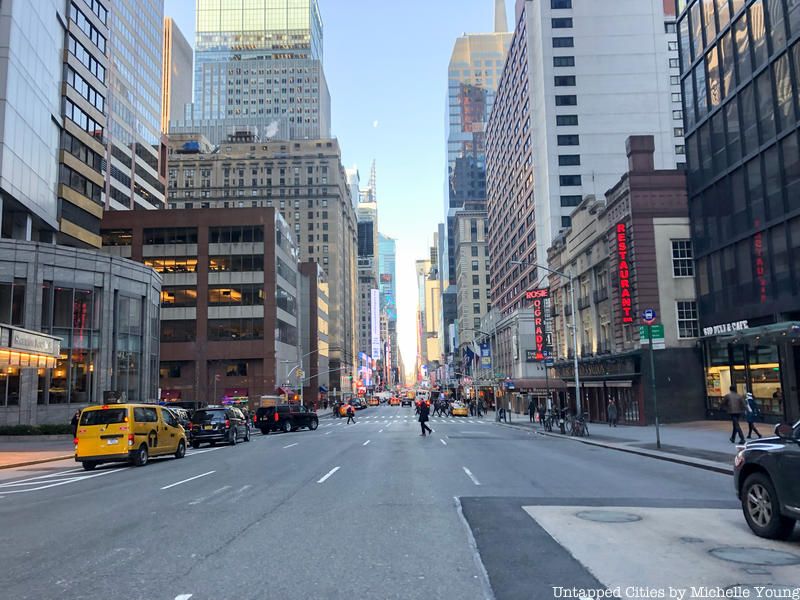
You don’t have to have seen the 1969 Dustin Hoffman featured movie, Midnight Cowboy, to have seen the iconic scene filmed on the crosswalk of 58th St. and 6th Avenue. This scene gave film-goers one of the most memorable quotes in all of cinema. After approximately fifteen different takes, Hoffman and co-star Jon Voight were crossing the street when an oncoming taxi drove into the shot and almost struck the actors. Staying in character, Hoffman hit the hood of the car and yelled, “Hey! I’m walking here!”
The scene was very real, and was in fact not scripted. Hoffman and Voight were legitimately almost hit by a taxi cab. While it’s not an ideal way to create an iconic movie moment, there certainly isn’t a doubt that it drastically hit home with people who have ever walked the streets of New York City.
The crosswalk, like many iconic movie locations throughout New York City, isn’t marked, but movie fans can still be impressed with the history that came out of Hoffman’s ad-lib on that crosswalk, although it’s not exactly recommended trying to recreate the scene.
3. Queensboro Bridge From 58th Street
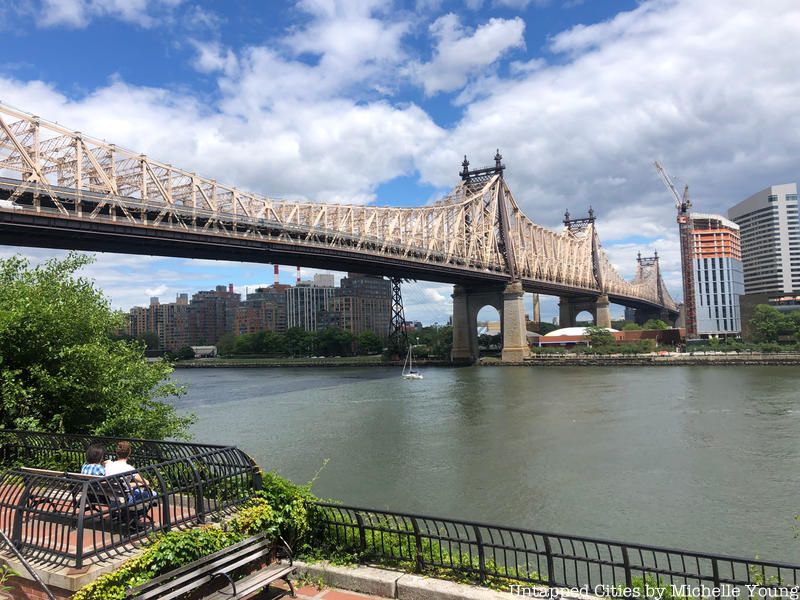 These were approximately the same views seen by Allen and Keaton
These were approximately the same views seen by Allen and Keaton
New York City is home to many spots that one could call romantic, but in Woody Allen‘s 1979 film, Manhattan, the foot of 58th St. is home to a movie shot that overlooks the East River and the Queensboro Bridge. Shot at 4 AM, Allen and Diane Keaton’s characters settle down on a bench after a nightlong walk and look out over the river.
The scene was filmed using only available light from the street, giving it a “real” feeling, and in the process showing off one of New York City’s softer touches. Enjoying a resurgence in filming, the Ed Koch Queensboro Bridge was also featured in several more recent movies including Now You See Me, Salt, and The Dark Knight Rises.
Unlike many other locations in the city that have become synonymous with famous films, the view of the Queensboro Bridge remains intact, with benches still placed at the foot of 58th St.
4. 55 Central Park West

55 Central Park West, or commonly known as “The Ghostbusters Building,” has become a must-visit for any fan of the film in New York City. The building was built in 1929, and designed by firm Schwartz & Gross, not by an insane architect who conducted rituals (like in the film).
In reality, the building is only a housing cooperative located within the Central Park West Historic District. However, it’s difficult for movie fans to not imagine the climax of The Ghostbusters outplaying in front of them when standing near the building. Although the building looks slightly different due to the altered roof in the movie, there is no doubt that 55 Central Park West is one of the most popular film locations in New York City, even though the film is relatively recent.
5. Church of St. Mary the Virgin on West 46th Street
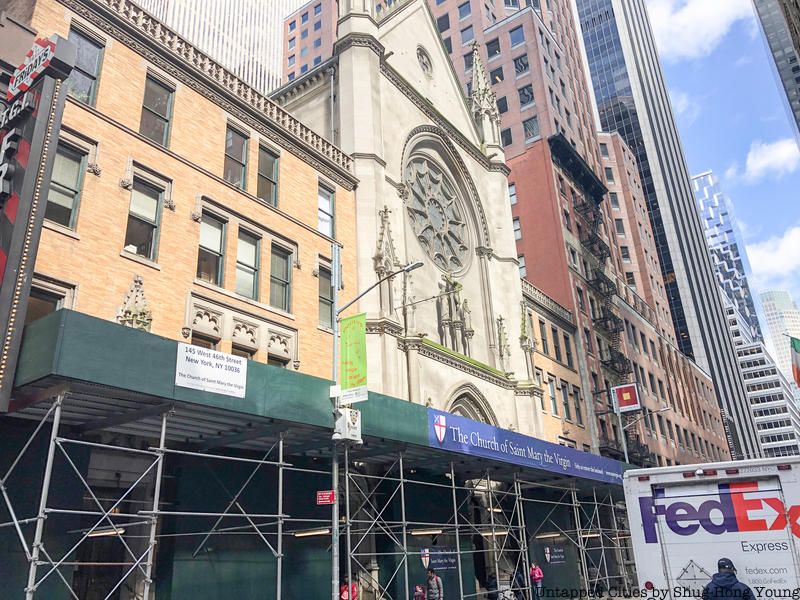
Many will remember the 1980 film, Fame, for it’s introspective look of the difficulties of thriving in the performing arts, as well as the struggles of handling heavy issues such as drug use and abortion as adolescents. The film centered around a group of students attending a performing arts high school located on 46th st. While the film was very much set at the actual High School of Performing Arts, the filming was actually done at the then-vacant Church of Saint Mary the Virgin directly across the street. Why? The Board of Education denied their request to film at the school because of the content of the script, which means that in the film, any scenes showing the outside of the school is actually the outside of the church, including the well-known scene of the students dancing in the street and performing the number for the title song, “Fame.”
The French-Gothic style Episcopal church that now resides on 46th street was designed by architect Napoleon LeBrun and his firm and opened in 1894. “Smoky Mary’s,” as it is often called due to the incense used, is still in use today and was listed as a New York City landmark in 1989.
6. Port Authority Bus Terminal on 8th Avenue
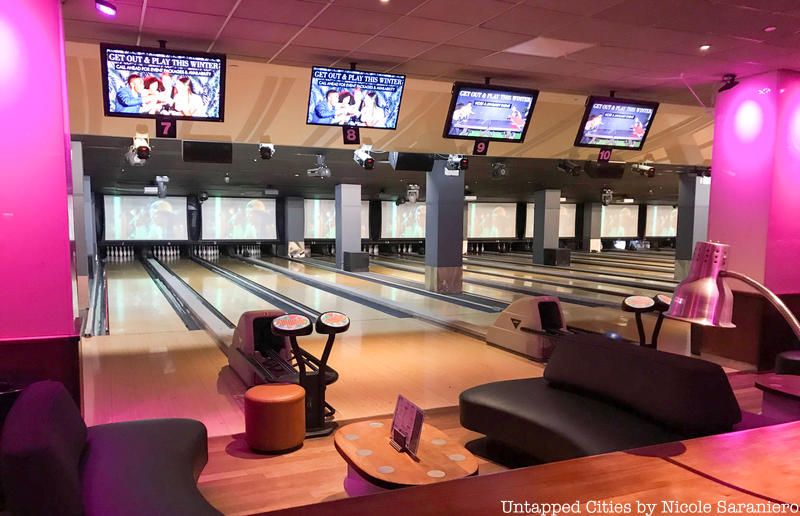 Bowling alley inside the Port Authority Bus Terminal
Bowling alley inside the Port Authority Bus Terminal
While the Port Authority Bus Terminal is anything from “untapped,” it might come as a surprise to some that many movies have used it as their filming location. While the bus terminal has been the filming location for movies like The Anderson Tapes and World Trade Center, perhaps the most notable film was the Madonna-featured Desperately Seeking Susan in 1985.
The terminal is featured prominently in the scene where Madonna is making her way into New York City uses a restroom hand dryer to blow on her underarms and face. It was a scene that helped prove to the world that Madonna was not just a musician, as the entire scene was improvised and fit in with her character perfectly. This scene not only helped establish the actress as an incredible talent, but also helped establish the busy terminal as a suitable candidate for filming.
The Port Authority Bus Terminal is considered the busiest terminal in the world based on volume, as well as the biggest in the country with 223 departure gates. As the volume of flow has continued to increase throughout the years, the building has continued to grow and make changes to find ways to accommodate, eventually leading to the now notorious look that has many considering the building ugly. Ugly or not, the Port Authority Bus Terminal has proved itself as a popular movie location.
7. Serendipity 3 on East 60th Street
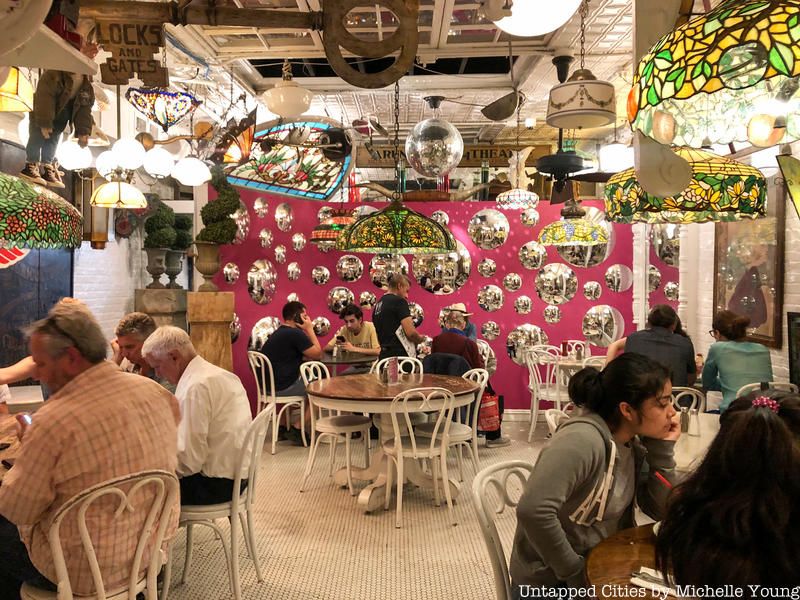
Serendipity 3, located on East 60th street, has been featured in several movies based in New York City, but most prominently in the movie whose name was inspired by the restaurant, Serendipity. The film, released in 2001, stars John Cusack and Kate Beckinsale and centers around the romance between two people who meet shopping at Bloomingdale’s Department Store and then share dessert at Serendipity 3 later that night. The restaurant is home to the two most important scenes in the film: the day the couple agrees to let fate decide their potential future in the beginning of the film, and the day they finally end up together again towards the end. Their table is in fact now known as the “Star Table.”
Serendipity 3 first opened in 1954 and was almost immediately popular. It brought in many patrons, including Andy Warhol before he was the artist he would become to be known by, due to its delectable desserts and unique recipes, like the Frrrozen hot chocolate. Over 60 years later, the restaurant is now home to the Guinness World Record holding dessert, the Frrrozen Haute Chocolate ice cream sundae, which holds the record for the world’s most expensive dessert at $25,000, as well as various other sweets and dinners that attract fans of Serendipity to New York City to recreate scenes from the movie.
8. Bethesda Terrace in Central Park
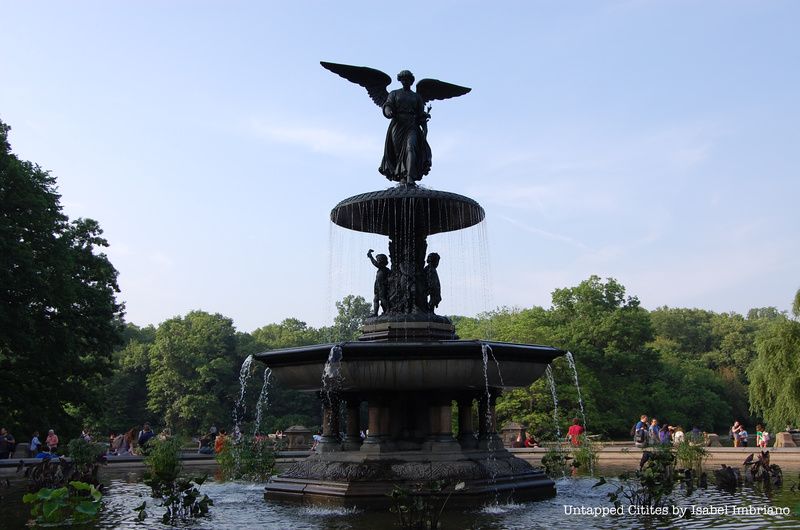
Located within Central Park overlooking The Lake, Bethesda Terrace has been used in a wide range of movies from The Producers to Godspell to Home Alone 2. But it was perhaps the 1996 film One Fine Day starring George Clooney and Michelle Pfeiffer that established the terrace as a distinguished filming location in New York City. The film is about two strangers, Clooney and Pfeiffer, whose lives intertwine when their children miss the bus for a field trip, causing them to spend the day with their children and each other. In a famous scene, the two parents and their children are splashing in puddles and racing through the lower level of the terrace.
The “heart” of Central Park is a grand two level terrace that was one of the first structures to be built in the park. The upper level runs nears 72nd St. while the lower level and fountain are connected to the Mall, accessible by a gorgeous walk through the park. It was completed in 1864 and designed to be the premier gathering location by park designers Frederick Law Olmsted and Calvert Vaux. Bethesda Terrace is widely considered to be home to one of the more beautiful views in all of New York City, which can easily explain why it has become a film favorite for shooting locations.
9. 7th Avenue
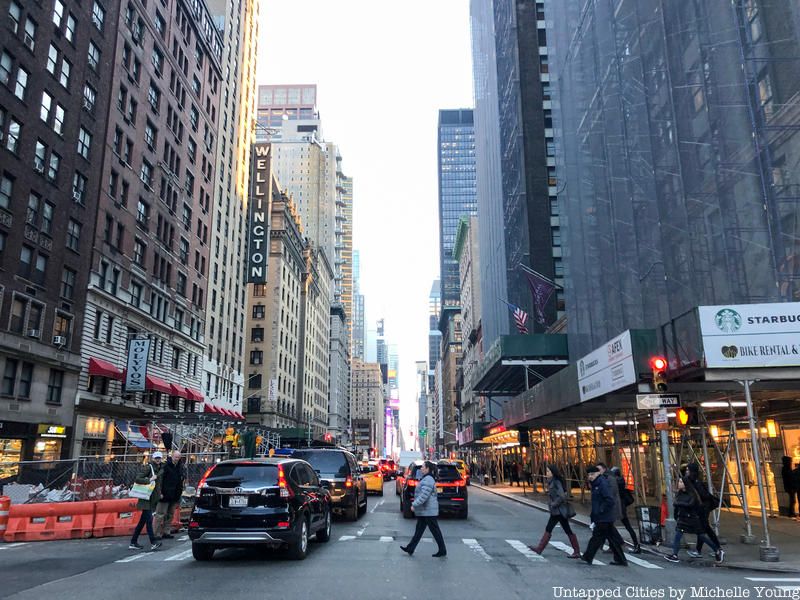
The 1994 film, Leon: The Professional, is a dark thriller that features Jean Reno as a professional assassin who takes in a young girl, Natalie Portman, after her parents are murdered and then reluctantly teaches her the trade. The film undoubtedly has a severely dark tone, but the scene that makes 7th Avenue an iconic movie location for New York City has a sense of wholesomeness to it. The scene features Reno walking through a deserted 7th Avenue, with the little girl and a house plant.
7th Avenue is not typically a place you can ever see vacant, like in the movie. Some of the most popular attractions in the world are located on, or around, 7th Avenue—Madison Square Garden, Penn Station, and Carnegie Hall are only some of the buildings that touch the avenue. This makes it eerie, yet warming, to see the two characters walking down the middle of the avenue with no traffic.
10. 5 Tudor City in Turtle Bay
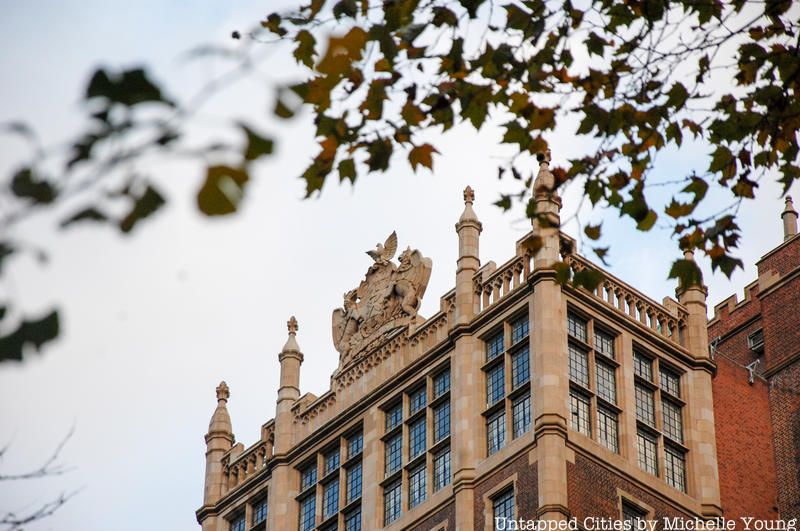
Tudor City, located on the southern edge of Turtle Bay on the east side of Manhattan, has been featured in its fair share of movies, most notably Scarface and Splash. However, the apartment complex at 5 Tudor City is most recognizable as the Manhattan luxury mansion of Norman Osborne (Spiderman’s nemesis, the Green Goblin) in the 2002 film Spiderman.
Tudor City is home to many apartments, as well as many small parks that are all privately run within its borders, which in 1976, New York City attempted to make public. But after a major court case, it failed to do so. The neighborhood of Tudor City was named a historic district in 1988.
Next, check out 12 Places in NYC that Inspired Great Music and 10 of the Most Iconic Film Scene Locations in NYC.

